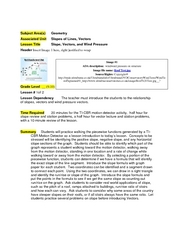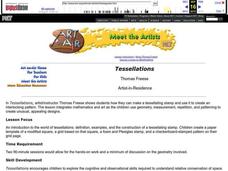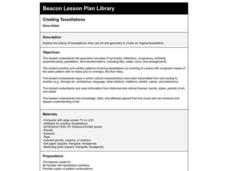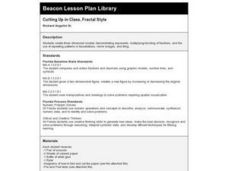Curated OER
Terrific Tessellations
Students construct tesselations that fosters their ability to create, transform, and critique their own piece of work. This allows them to become aware of repeated patterns in math, and connect these patterns to artwork.
Curated OER
Tessellations WOW!
Young scholars identify and manipulate shapes to create tessellations. In these geometry/spatial relations lessons, the students use of a variety of modalities such as literature, music, writing, and art as introductions to the concept...
Curated OER
Introducing Tessellations
Learners create tessellations to increase their knowledge of the applications of geometry. They explore the different shapes of polygons.
Curated OER
What do two-dimensional tessellations look like? Where in art can they be found?
Learners explore the world of art and culture, including the works of M.C. Escher. They identify and create original tessellations. Students use a wealth of interactive multimedia applications. They explore the artistic representations...
Curated OER
Slope, Vectors, and Wind Pressure
A hands-on instructional activity using the TI-CBR Motion Detector to provide information to graph and analyze. The class uses this information to calculate the slope of motion graphs and differentiate scalar and vector quantities. There...
World Wildlife Fund
Take 6
Investigate the various properties of the number six with this elementary math lesson. From simple addition, subtraction, multiplication, and division problems to the creation of hexagonal tessellations, this lesson covers all aspects of...
Wake Forest University
Authentic Activities for Connecting Mathematics to the Real World
Check out the handout from a presentation that contains a collection of high school algebra projects connecting a variety of mathematics to the real world. Activities range from simple probabilities to calculus. The activities...
Earth Day
Introduction To Scale Drawings
Real-life math is really great! In groups, learners measure objects in the classroom. After comparing measurements, they determine a scale and create a blueprint of the classroom. They discuss the purpose of using scale drawings in...
Curated OER
Tessellations
Young scholars learn and review basic geometric terms, definitions, and theory, including regular polygons, lines, angles, points, etc. They make a tessellating stamp and create a repeating work of art.
Curated OER
Creating Tessellations
Third graders explore the history of tessellations; then use art and geometry to create an original tessellation.
Curated OER
Transformations
Several practice exercises suitable for any geometry class working on transformation, symmetry, and tessellation -- especially visual representations of image translation, rotation, and reflection, symmetry, tessellations and tangrams --...
Curated OER
Tessellation Design And Construction
Students study the basic elements and concepts of the visual art's perceptual component - such as shape, line and color. They create tessellations that foster problem solving and reflective thinking.
Texteam Geometry Institute
Geometry for the High School Classroom
What does it mean for apples to have chirality? This and other explorations in geometry, such as tiling the plane, boxing a tetrahedron, and investigating Euclid's Characteristic, are included in this resource on Euclidean geometry....
Curated OER
Terrific Tessellations
Students create, transform, and critique their own piece of artwork. In doing this lesson, students get more experience working with angles, lines, and measurement. They gain experience seeing, and creating their own patterns and shapes.
Curated OER
Back to the Bees (Tesselations)
Sixth graders observe the creation of a tessellation with hexagons. In groups, they work with polygons to discover what shapes can be used to create tessellations and explore the angle measurements of each shape. Using internet websites,...
Curated OER
Symmetry of Road Signs
Young scholars identify symmetry in road signs. In this geometry activity, students explore objects in the real world for symmetry. They perform translation, rotation and reflection.
Curated OER
Tessellation Trial and Error
In this interactive lesson, students review attributes of equilateral polygons. They are introduced to the concept of a tessellation. Using protractors and pre-cut shapes, students arrange a variety of tiles to create tessellations. They...
Curated OER
Tessellations and T-Shirts
Students combine the visual arts and technology with mathematics in the creation of these beautiful t-shirts. They view examples of the work of artist M.C. Escher.
Curated OER
The Geometry of Indigenous Art
Students examine the concepts of symmetry, rotations, reflections, translation, dialations, and tessellations and apply them to indigenous art. They also do Internet research and create artwork (painting, pottery, computer graphic design).
Curated OER
Let's Tesselate
Students investigate the geometrical concepts of translation, reflection, and rotation. They make different observations looking for the concepts that are displayed in classroom items like floor tiles, carpet designs, and visuals hung in...
Curated OER
Cutting Up in Class, Fractal Style
Students create three-dimension models demonstrating exponents, multiplying and dividing of fractions, and the use of repeating patterns in tessellations, mirror images, and tiling.
Curated OER
Areas of Polygons
Students calculate the are of regular polygons. In this geometry lesson, students create polygons on the computer and move it around to create different shapes. They explore the area of different polygons and how they inter-relate.
Curated OER
Mathematics of Ornaments and Architecture
Students study African traditional architecture. They examine how African ornaments, wall painting and motifs use geometric shapes to express and explain the culture.
They discuss the ornaments and architectural designs in the setting...
Curated OER
Transformation: Reflection
Tenth graders identify and analyze appropriate key vocabulary terms associated with transformations and reflection. Students experience creating and recognizing reflection with hands-on manipulations. Students discover real-world...

























